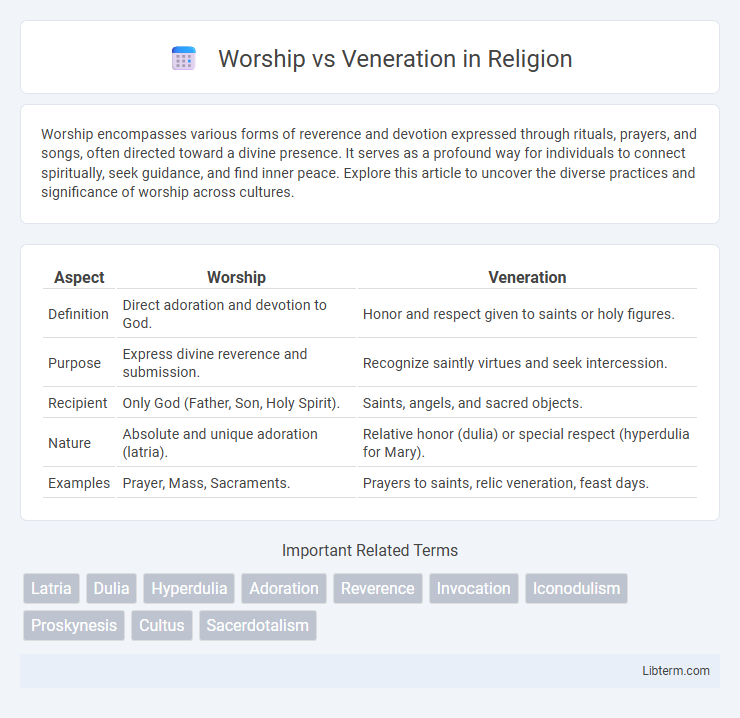Worship encompasses various forms of reverence and devotion expressed through rituals, prayers, and songs, often directed toward a divine presence. It serves as a profound way for individuals to connect spiritually, seek guidance, and find inner peace. Explore this article to uncover the diverse practices and significance of worship across cultures.
Table of Comparison
| Aspect | Worship | Veneration |
|---|---|---|
| Definition | Direct adoration and devotion to God. | Honor and respect given to saints or holy figures. |
| Purpose | Express divine reverence and submission. | Recognize saintly virtues and seek intercession. |
| Recipient | Only God (Father, Son, Holy Spirit). | Saints, angels, and sacred objects. |
| Nature | Absolute and unique adoration (latria). | Relative honor (dulia) or special respect (hyperdulia for Mary). |
| Examples | Prayer, Mass, Sacraments. | Prayers to saints, relic veneration, feast days. |
Defining Worship and Veneration
Worship is the act of showing reverence and adoration exclusively to a deity, involving rituals, prayers, and offerings that acknowledge divine supremacy. Veneration refers to the respectful honor given to saints, holy objects, or religious figures, recognizing their exemplary lives or spiritual significance without attributing divine status. The crucial distinction lies in worship being reserved for God alone, while veneration expresses deep respect without equating the recipient to divine worship.
Historical Origins of Worship and Veneration
Worship and veneration trace back to ancient religious practices where worship was primarily directed toward deities as an expression of reverence and submission, often involving rituals, sacrifices, and prayers. Veneration evolved as a form of deep respect given to saints, ancestors, or sacred objects, distinguished from worship by its non-divine focus and historical roots in early Christian and pagan traditions. Archaeological findings from Mesopotamia and Egypt reveal early forms of worship, while veneration emerged more clearly in the context of early Christian communities honoring martyrs and relics.
Scriptural Foundations for Each Practice
Worship in Scripture is directed exclusively to God, as seen in John 4:24 where Jesus emphasizes worshiping the Father in spirit and truth, highlighting the unique divine status of God requiring total devotion. Veneration, by contrast, involves honor given to saints or angels, supported by biblical examples like Hebrews 11 which commends revered faith heroes without equating their honor to God's worship. Distinguishing worship (latria) as God's exclusive right from veneration (dulia) as respectful honor maintains clear biblical boundaries grounded in texts such as Exodus 20:3-5 and Revelation 19:10.
Key Differences Between Worship and Veneration
Worship involves complete adoration and reverence directed exclusively toward a divine entity, reflecting ultimate submission and devotion. Veneration, by contrast, is a sign of deep respect or honor given to saints, sacred objects, or symbols, without attributing divinity to them. Key differences include the nature of the recipient--God in worship versus honored figures or relics in veneration--and the level of devotion, where worship demands absolute allegiance and veneration acknowledges holiness without equating it to divine worship.
Worship in Major World Religions
Worship in major world religions such as Christianity, Islam, Hinduism, and Buddhism involves acts of reverence aimed at a supreme deity or divine principle, often through prayer, rituals, and sacred ceremonies. In Christianity, worship centers on the Trinity and includes hymns, sacraments, and communal gatherings, while Islam emphasizes worship through Salah (prayer) five times daily, fasting, and pilgrimage to Mecca. Hindu worship, or puja, involves offerings and rituals directed at various deities, and in Buddhism, worship often includes meditation and offerings to the Buddha and bodhisattvas, reflecting devotion to enlightenment rather than a creator god.
Veneration in Various Faith Traditions
Veneration involves deep respect and honor shown to saints, ancestors, or sacred objects across numerous faith traditions, such as the Catholic practice of honoring Mary and the saints, the reverence of Bodhisattvas in Mahayana Buddhism, and the respect given to ancestors in Confucianism. Unlike worship, which is reserved for deities alone, veneration emphasizes a devotional attitude that supports spiritual connection and moral inspiration. This practice strengthens communal identity and personal faith through rituals, prayers, and symbolic offerings.
Common Misconceptions and Controversies
Worship is the act of showing reverence and adoration exclusively to a divine being, while veneration involves deep respect or honor directed toward saints or sacred objects without attributing divinity. Common misconceptions arise when veneration is mistaken for worship, leading to controversies in theological debates, especially within Christian traditions distinguishing idolatry from legitimate honor. These misunderstandings fuel disputes over practices such as praying to saints or venerating icons, highlighting the crucial difference between worship as ultimate devotion and veneration as respectful homage.
Cultural Influences on Worship and Veneration
Cultural influences on worship and veneration shape distinct practices where worship often emphasizes devotion to a divine being, while veneration focuses on honoring saints, ancestors, or revered figures. In Eastern cultures, veneration of ancestors plays a crucial role in maintaining social harmony and spiritual connection, whereas Western traditions frequently prioritize worship through structured liturgies and sacraments. Understanding these cultural nuances highlights how worship and veneration reflect broader societal values, rituals, and historical contexts.
Theological Implications and Debates
Worship, reserved exclusively for the divine nature of God, denotes supreme adoration and submission, while veneration involves profound respect and honor given to saints and sacred objects without equating them to God. Theological debates often center on the risk of idolatry inherent in veneration practices and the clear demarcation between latria (worship) and dulia (veneration) established in Christian doctrine, particularly within Catholic and Orthodox traditions. These distinctions underscore essential implications for soteriology, Christology, and ecclesiology, influencing how believers relate to the divine and the communion of saints.
Practical Expressions in Religious Life
Worship in religious life is expressed through rituals such as prayer, singing hymns, and attending services, emphasizing direct reverence toward a deity. Veneration manifests in acts like honoring saints, venerating relics, and observing feast days, highlighting respect for holy figures without equating them to divine status. Both practices shape community identity, influencing devotional behavior and spiritual discipline across various faith traditions.
Worship Infographic

 libterm.com
libterm.com